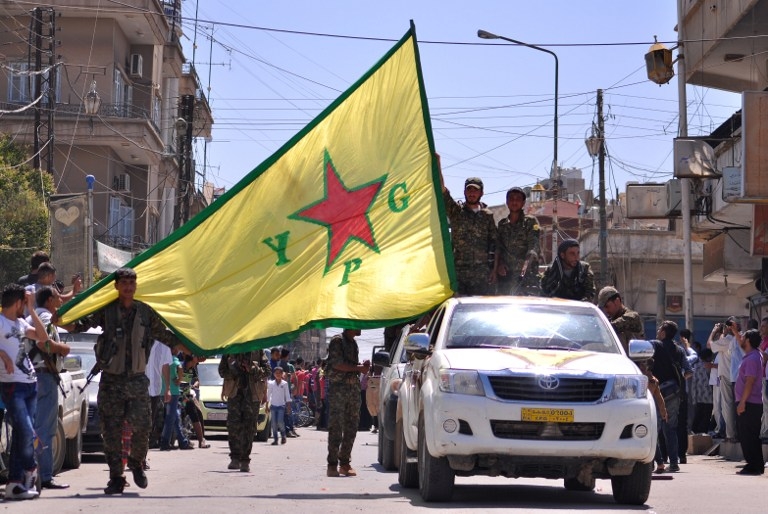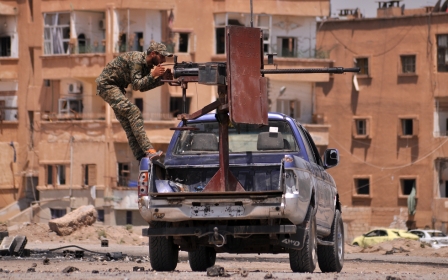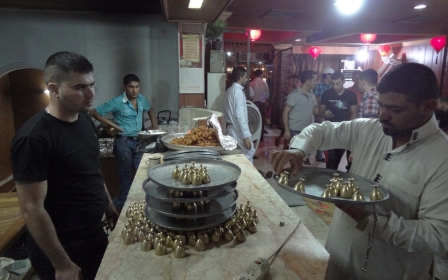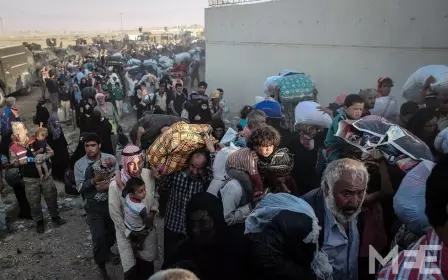Does arming the Kurds mean the West backs forces committing war crimes?

In the sometimes hysterical political debate since the 13 November Paris terrorist attacks, a strange consensus has coalesced around how the UK should respond to the rise of Islamic State (IS) group.
With the Kurds garnering a great deal of sympathy in the West since the 1991 Gulf War, prominent progressive commentators opposed to direct UK military intervention in Syria agree that we should be “systematically arming” the Kurdish militia, as Labour leftist and newspaper columnist Owen Jones argued on a recent edition of BBC Sunday Morning Live. Similarly, last year Al Jazeera presenter Mehdi Hasan wrote that “Progressives need to get behind the Kurds”. Ditto George Galloway. The Tory government agrees, and has been training and arming Kurdish forces in Iraq since 2014.
The human rights campaigner Peter Tatchell is another supporter of arming the Kurds, recently arguing a “successful strategy might be to empower” the Kurdish People’s Protection Units (YPG) in northern Syria and the Kurdish Peshmerga in Iraq – both of which have been fighting Islamic State.
However, Amnesty International in October 2015 released a report that found “evidence of alarming abuses, including eyewitness accounts and satellite images, detailing the deliberate displacement of thousands of civilians and the razing of entire villages” in areas of northern Syria under the control of the Syrian Kurdish political party PYD (the political party of the YPG militia).
“By deliberately demolishing civilian homes, in some cases razing and burning entire villages, displacing their inhabitants with no justifiable military grounds, the [PYD-controlled] Autonomous Administration is abusing its authority and brazenly flouting international humanitarian law, in attacks that amount to war crimes,” Lama Fakih, a Senior Crisis Advisor at Amnesty International, noted.
I challenged Tatchell on Twitter, asking why he was urging support for groups that were committing war crimes, linking to the Amnesty International report. His reply? “This action was wrong but exceptional & untypical of YPG. Overall, they have a good record of protecting civilians.”
“Exceptional & untypical” is certainly one way to describe what Amnesty International call “the deliberate displacement of thousands of civilians” from at least eight villages. Reporting from the same area in July 2015, the Independent’s Middle East correspondent Patrick Cockburn wrote that the conflict “has many aspects of an ethnic war: the Kurds are driving out Sunni Arabs, whom they accuse of being Islamic State supporters".
In June 2014 Human Rights Watch (HRW) released a 107-page report on the human rights situation in PYD-run enclaves in Syria. According to HRW there are arbitrary arrests of the PYD’s political opponents, abuses in detention, the use of child soldiers and excessive force was used to quell political protests.
A similar picture emerges of the Kurdish forces fighting Islamic State in Iraq. A February 2015 report by Human Rights Watch highlighted how “Kurdish forces have confined thousands of Arabs in ‘security zones’ in areas of northern Iraq that they have captured since August 2014” from Islamic State. In addition, “Kurdish forces for months barred Arabs displaced by fighting from returning to their homes … while permitting Kurds to return to those areas and even to move into homes of Arabs who fled.”
Local Kurds told HRW that Kurdish forces had destroyed dozens of Arab homes. One European diplomat familiar with the areas under Kurdish control explained there was “deliberate, systematic destruction of Sunni Arab property” by the Peshmerga. “It’s not just collective punishment for perceived support. It’s wholesale ethnic cleansing.”
Another recent report for the Middle East Eye describes a recent Dutch television documentary that filmed a commander of the Kurdish People’s Defence Force in Iraq saying that his forces did not take any prisoners. “Not in my forces, nowhere actually. Let’s be honest – simply nowhere. We don’t want prisoners.” (Unsurprisingly, the Kurdish authorities in Syria and Iraq have denied the claims made by the documentary and the reports from Amnesty International and Human Rights Watch.)
All this is not to say that, all things considered, arming the Kurds might not be the least worst realistic option available to Western governments and publics interested in defeating Islamic State. However, when deciding on what action, if any, to take in Syria and Iraq, it is essential the general population has an accurate understanding of what is happening in these conflicts, and a realistic picture of those we are supporting or plan to support.
The prominent progressives named above have not told their readers the truth about the Kurdish forces they are urging the West to arm. Furthermore, the de facto ethnic cleansing the Kurdish forces are reported to have carried out in Syria and Iraq is likely to have been counterproductive, pushing local populations into the arms of the Islamic State or other forces they feel can protect them.
“The charges also raise a complex question for the countries that train and equip Kurdish forces,” journalist Sara Elizabeth Williams notes in her Foreign Policy article about the abuses carried out by Kurdish forces in Iraq. “Can they continue to supply military aid if their weapons are used to commit what experts say amount to war crimes?”
-Ian Sinclair is a freelance writer based in London and the author of The March that Shook Blair: An Oral History of 15 February 2003. He tweets @IanJSinclair
The views expressed in this article belong to the author and do not necessarily reflect the editorial policy of Middle East Eye.
Photo: Kurdish People's Protection Units (YPG) militiamen wave their movement's flag as they parade in the northeastern Syrian town of Qamishli on 24 June, 2015 (AFP).
Middle East Eye propose une couverture et une analyse indépendantes et incomparables du Moyen-Orient, de l’Afrique du Nord et d’autres régions du monde. Pour en savoir plus sur la reprise de ce contenu et les frais qui s’appliquent, veuillez remplir ce formulaire [en anglais]. Pour en savoir plus sur MEE, cliquez ici [en anglais].





